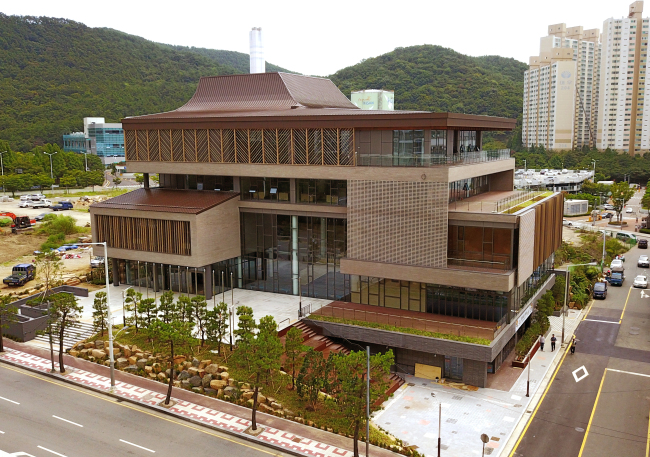With the launch of the ASEAN Culture House in Busan on Sept. 1, the public gains a valuable platform through which to peer into the thriving lives of Southeast Asians, said the president of Korea Foundation, urging Korea’s genuine interest in the region’s myriad local cultures.
“To maintain a sustainable partnership with ASEAN (the Association of Southeast Asian Nations), we should bear in mind that it takes two to tango. The ASEAN Culture House was established to correct any imbalance in our exchanges, and demonstrates our sincere efforts to understand ASEAN,” said Lee Si-hyung, who has taken helm of the public diplomacy institution since May last year, in an interview.
“All in all, ASEAN is becoming an increasingly important partner for South Korea and has eagerly absorbed our culture, products and everything in between. It is high time for Koreans to ponder whether we have reciprocated such generosity shown by the ASEAN people.”
The Korea Foundation, under the auspices of the Ministry of Foreign Affairs, has been tasked with managing the operation of the edifice located in Busan’s Haeundae District. The building was borne out of cooperation with the Busan municipal government. While the role of the foundation is to promote Korea around the world, including in Southeast Asia, the new institute is designed to strengthen and uplift Korea’s understanding of the region, according to the foundation.
 |
Korea Foundation President Lee Si-hyung (Korea Foundation) |
Encompassing exhibition galleries, a concert hall, a seminar room and other spaces over six floors, the facility is the largest of its kind outside the ASEAN region, and also the first in the world built by a national government. The opening of the building coincides with the ASEAN-Korea Cultural Exchange Year of 2017.
Exhibitions will offer visitors easy access to the region’s distinctly unique cultures, he said, mentioning that various lectures and forums are designed to help create links between Koreans and ASEAN nationals from Brunei, Cambodia, Indonesia, Laos, Indonesia, Myanmar, the Philippines, Singapore, Thailand and Vietnam.
Currently, an exhibition titled “Celebrating the Beauty of Marriage -- Viewing ASEAN through the Culture of Marriage,” is underway through Dec. 3; documentary films will be screened from Thursday to Sunday in collaboration with the EBS International Documentary Festival; a series of lectures on ASEAN members’ histories and societies will be organized from October to November; and a networking platform for ASEAN and Korean students in the Gyeongsang provinces, dubbed “ASEAN-Korea Futurist,” will be hosted.
“ASEAN is a multicultural, multiethnic and multireligious region,” Lee explained, citing the ancient Cambodian temple complex Angkor Wat that fused Hinduism and Buddhism, as well as Singapore’s system of categorizing its different Chinese, Malay, Indian and other ethnicities.
ASEAN’s motto, “unity in diversity,” reflects its disparate political and economic systems, ranging from democracy to monarchy and military government, as well as from developing economies to developed ones, he said. Furthermore, the regional bloc’s decision-making is done through constant consultation, dubbed “the ASEAN way,” emphasizing consensus-building and political noninterference. “ASEAN’s political process may appear slower and its scope of cooperation may look smaller than the European Union’s, but it contributes to a stable process of integration,” he said.
In the realm of economy, ASEAN is emerging as an economic powerhouse by capitalizing on its location that encompasses the world’s busiest maritime corridor in the Indo-Pacific region between China and India, chiefly the Straits of Malacca and South China Sea.
“In a geopolitical context, it is a region where global powers’ interests converge, most notably those of China and the US. In regard to the Korean Peninsula, ASEAN can play a mediating role by using its diplomatic ties with North Korea. Thus it has the potential to shape the region’s security landscape,” the former career diplomat said.
 |
The ASEAN Culture House in Busan (Korea Foundation) |
Lee was South Korea’s ambassador and permanent representative to the Organization for Economic Cooperation and Development from 2013-2015; deputy minister for trade at the former Ministry of Foreign Affairs and Trade from 2011-2013, during which he was also the G-20 ambassador; and ambassador to Poland from 2006-2009.
ASEAN, whose combined population is 640 million with an economy of $2.5 trillion, has become Korea’s second-largest trade partner after China, Lee noted. He added that shrinking trade with China and Hallyu’s waning popularity there resulting from Beijing’s alleged retaliation against the deployment of the US Terminal High Altitude Area Defense anti-missile system in Korea has been offset by increasing commercial exchanges with ASEAN.
“Korea’s perception of ASEAN as a merely cheap production site using low-cost labor needs to be transformed,” the president asserted, adding a deeper understanding would foster untapped opportunities in Southeast Asia’s young, dynamic and growing market.
“Many migrants from ASEAN who have settled in Korea or are working here are mitigating our demographic decline, as our population shrinks and ages. They also play prominent roles in diverse areas of our society.”
Lee added that racial prejudices against people and cultural practices of ASEAN are still prevalent in Korean society. Korea’s previous efforts at integrating outsiders have been lopsided, focusing on assimilating them rather than respecting their own cultures.
“Now is the time to foster true multiculturalism in Korea, where different cultures can coexist harmoniously,” the bureaucrat urged. “To advance our society democratically, it is imperative to learn more about ASEAN. With society-wide participation, the ASEAN Culture House will be able to fulfill its role as a solid bridge of friendship and communication between the two regions.”
By Joel Lee (
joel@heraldcorp.com)







![[Herald Interview] 'Trump will use tariffs as first line of defense for American manufacturing'](http://res.heraldm.com/phpwas/restmb_idxmake.php?idx=644&simg=/content/image/2024/11/26/20241126050017_0.jpg)
![[Exclusive] Hyundai Mobis eyes closer ties with BYD](http://res.heraldm.com/phpwas/restmb_idxmake.php?idx=644&simg=/content/image/2024/11/25/20241125050044_0.jpg)
